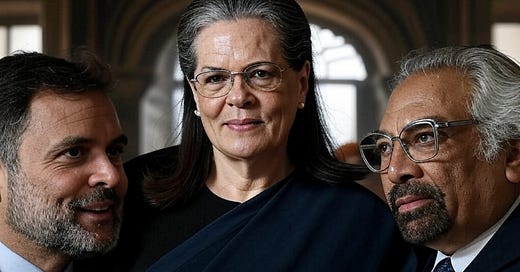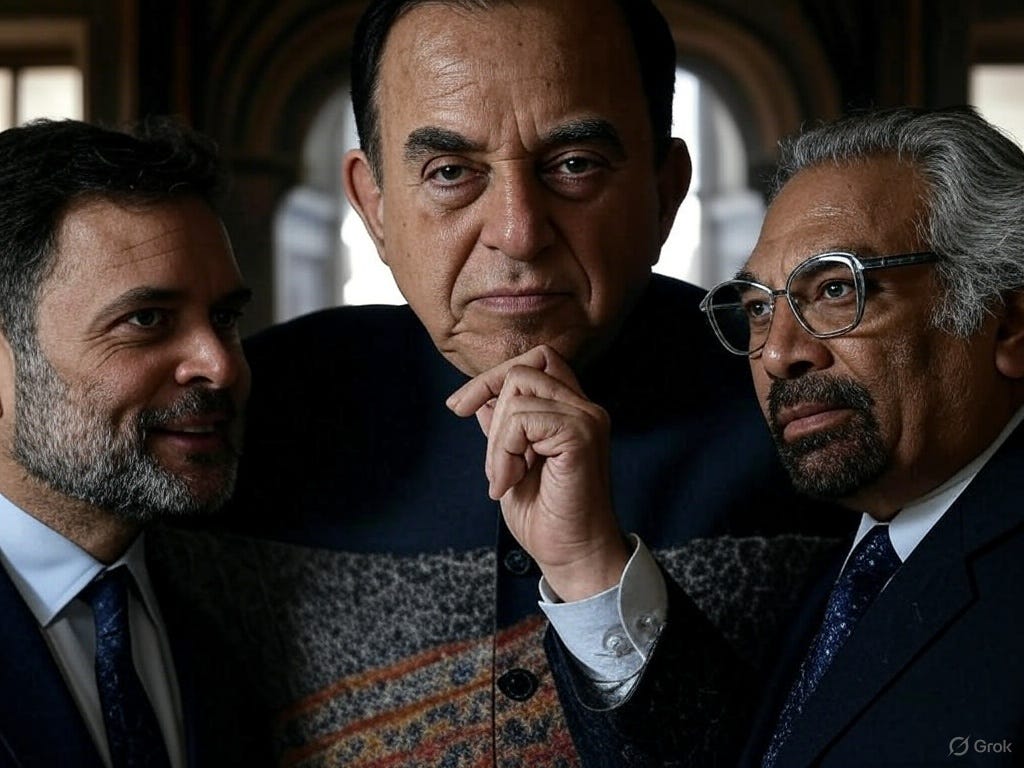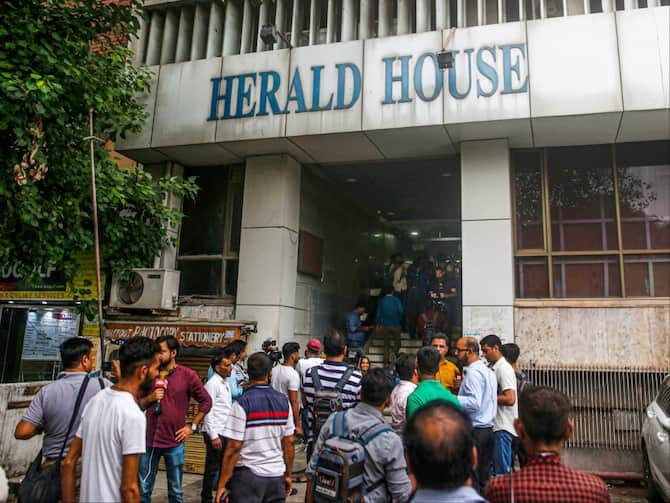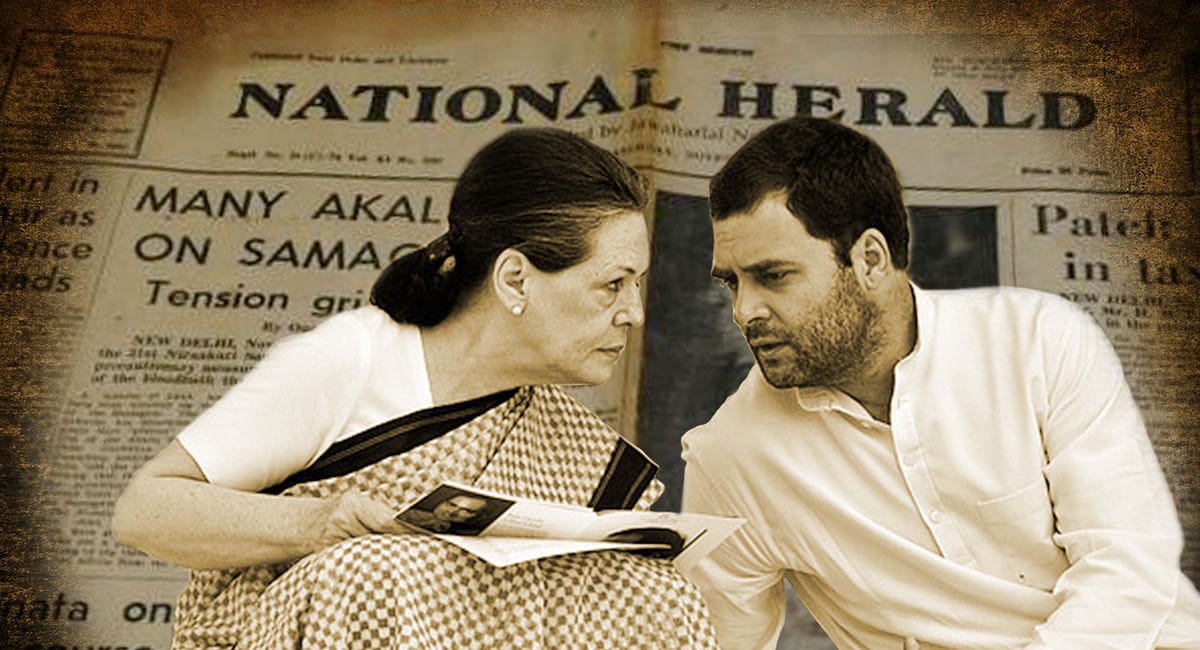National Herald Scam: ED Charges Sonia, Rahul, Pitroda in ₹2,000 Cr PMLA Case
Special PMLA Court to Weigh Cognizance on April 25.
National Herald Scam: ED Slaps PMLA Charges on Sonia, Rahul, Pitroda
Breaking: In a dramatic escalation of the National Herald saga, the Enforcement Directorate (ED) today (on 15 April 2025) filed a prosecution complaint (chargesheet) under the Prevention of Money Laundering Act (PMLA) against senior Congress leaders Sonia Gandhi, Rahul Gandhi, and technocrat Sam Pitroda. This marks the first formal criminal indictment of the Gandhis in the high-stakes financial scandal that has simmered for over a decade, under PMLA. The chargesheet accuses the trio of laundering ₹988 crore through intricate financial transactions.
Special Judge Vishal Gogne has listed the case for 25 April, where the court will decide whether to take cognizance of the charges. Significantly, the legal experts have emphasised the balance of convenience of concurrently trying the predicate offences—cheating, breach of trust, and criminal conspiracy—along with the PMLA offences, as both stem from the same factual matrix.
Recent Developments: ED’s Chargesheet and Asset Seizure
ED’s Prosecution Complaint and Legal Mechanics
The chargesheet names Sonia Gandhi (Accused No. 1), Rahul Gandhi (Accused No. 2), Sam Pitroda (Congress’ overseas unit chief), and Suman Dubey (Rajiv Gandhi Foundation trustee) as key actors in the alleged money laundering scheme. The ED’s case hinges on the 2010 acquisition of Associated Journals Limited (AJL)—publisher of the now-defunct National Herald—by Young Indian Private Limited (YIL), ostensibly a not-for-profit company controlled by the Gandhis. It alleges that YIL, with a paid-up capital of just ₹5 lakh, acquired AJL’s ₹2,000 crore worth of assets through a mere ₹50 lakh transaction, converting Congress’ ₹90.25 crore loan to AJL into equity.
Judge Gogne is reported to have underscored the imperative to try the predicate offences under IPC Sections 403, 406, 420, and 120B alongside the money laundering case under the PMLA, given the shared factual basis, although we could not find any mention thereof in the short interim order of the Court. Meanwhile, the ED has moved to seize AJL’s properties valued at ₹751.9 crore in Delhi, Mumbai, and Lucknow, including Herald House in Delhi and a prime Bandra property. Notices have also been issued to tenants, such as Jindal South West Projects, instructing them to redirect rent payments to the ED.
Political Reactions and Allegations of Vendetta
Congress General secretary Jairam Ramesh denounced the chargesheet as an act of “political vendetta” orchestrated by the Prime Minister and Home Minister. The party maintains that the AJL-YIL transaction was a legitimate equity transfer meant to settle debts and revive a historic media institution. Conversely, the ED asserts that AJL’s assets were unlawfully leveraged to generate “proceeds of crime” through bogus donations (₹18 crore), advance rents (₹38 crore), and advertisements (₹29 crore).
Background: From Nehru’s Legacy to Alleged Financial Fraud
Origins of the National Herald and AJL’s Decline
Founded in 1938 by Jawaharlal Nehru, the National Herald served as a Congress-aligned publication until its closure in 2008 due to mounting debts of ₹90 crore. AJL, its publisher, retained prime real estate in Delhi, Mumbai, and Lucknow, much of it acquired at concessional rates for media purposes. In 2010, the Congress extended an interest-free loan of ₹90.25 crore to AJL, ostensibly to relaunch the newspaper. Instead of repaying the loan, AJL transferred its debt to YIL, the so-called not-for-profit company, for merely ₹50 lakh, effectively handing over 99% of its shareholding and assets.
Subramanian Swamy’s Complaint and the Predicate Offence
The controversy was triggered by a 2014 complaint by BJP leader Dr Subramanian Swamy, who alleged that Sonia and Rahul Gandhi, through YIL, orchestrated a “criminal conspiracy” to seize AJL’s assets at a fraction of their value. The Delhi Metropolitan Magistrate took cognizance of the complaint in 2015, which paved the way for a CBI investigation into charges of cheating and criminal breach of trust. In 2021, the ED began its own probe into the alleged laundering of funds linked to the AJL asset transfer. Despite multiple legal challenges from the Congress, the Supreme Court refused to quash the proceedings, allowing the ED to attach AJL’s properties in 2023.
The CBI Link: From Private Complaint to Public Prosecution
The Gandhis were charged in the predicate offences under Indian Penal Code (IPC) Sections 403 (dishonest misappropriation of property), 406 (criminal breach of trust), 420 (cheating), and 120B (criminal conspiracy), all rooted in Dr Subramanian Swamy’s 2012 private criminal complaint, while the UPA Government lead by Sardar Manmohan Singh was in power. The core allegation was that Sonia Gandhi, Rahul Gandhi, and others conspired to acquire Associated Journals Limited (AJL)’s assets—worth an estimated ₹2,000 crore—for just ₹50 lakh through the vehicle of Young Indian Limited (YIL), a company they controlled.
Dr Swamy’s complaint, though private in origin, led the Delhi Metropolitan Magistrate to take cognizance in 2014, summoning the accused to appear in court. The proceedings remained within the ambit of private prosecution until 2021, when the Enforcement Directorate launched a formal probe under the Prevention of Money Laundering Act (PMLA), treating the alleged criminal conspiracy as the predicate offence for money laundering.
In parallel, the Central Bureau of Investigation (CBI) entered the fray based on court directions and registered an FIR to independently investigate the underlying IPC charges. The ED’s money laundering case, filed under Sections 3 and 4 of the PMLA, relies heavily on the CBI’s investigation to establish that the assets in question were tainted and acquired through criminal activity. Thus, while the predicate offences trace back to a citizen-initiated complaint, the case has since evolved into a multi-agency legal pursuit, with the ED and CBI operating on interconnected but procedurally distinct tracks.
Legal Proceedings: From Courts to Asset Attachment
Judicial Scrutiny and PMLA Enforcement
The Delhi High Court and the Supreme Court have both upheld the ED’s investigation, rejecting Congress’ claims of political targeting. Notable legal milestones include:
2015: Delhi Metropolitan Magistrate summons Sonia and Rahul Gandhi.
2021: ED initiates PMLA probe; AJL properties worth ₹661 crore provisionally attached.
2023: PMLA Adjudicating Authority confirms attachment.
2024: ED initiates possession proceedings under Section 8 of the PMLA.
The ED’s chargesheet asserts that YIL’s acquisition of AJL facilitated the misuse of its assets for private enrichment, violating key provisions of the PMLA. Financial records of AJL, according to the agency, are riddled with inconsistencies, unaccounted donations, and inflated rental income.
Sam Pitroda’s Role and Cross-Border Complications
Sam Pitroda, a close Gandhi confidant and YIL director, is under additional scrutiny for allegedly channelling funds via overseas routes. As a U.S. passport holder, Pitroda’s foreign citizenship could complicate judicial proceedings, and the ED has hinted at seeking extradition if he fails to appear.
Monetary Gains and Alleged Misappropriation
Valuation Gaps and Equity Manipulation
The core of the ED’s case lies in the wide chasm between AJL’s asset valuation (₹2,000 crore) and YIL’s acquisition price (₹50 lakh). Through the conversion of Congress’ interest-free loan into equity, YIL gained de facto control over prime real estate in Delhi, Mumbai, and Lucknow without any open market valuation. The Income Tax Department has categorically termed the original loan as “bogus,” implying that it was fabricated to mask a fraudulent asset takeover.
Streams of Illicit Funds
Investigators have identified three streams of questionable revenue:
Bogus Donations: ₹18 crore routed through shell companies.
Advance Rent Collections: ₹38 crore received without formal agreements.
Fake Advertisements: ₹29 crore billed to fictitious or non-operational entities.
The ED alleges that these sums were laundered and redirected into Congress Party campaigns and private ventures, thereby completing a cycle of illicit financial flow.
Challenges and the Path Ahead
Legal Hurdles and Political Narratives
The Congress continues to frame the case as a politically motivated campaign led by the ruling dispensation. However, the judiciary’s refusal to quash the charges highlights the seriousness of the evidence at hand. The legal process faces several challenges:
Witness Overlap: Many witnesses are common to both the predicate and PMLA cases, necessitating synchronised trials.
Property Disputes: Tenants occupying AJL properties have filed appeals against ED notices.
International Enforcement: Pitroda’s foreign citizenship introduces diplomatic and procedural complexities.
The Imperative for Expeditious Justice
Judge Gogne’s decision to club the trials signals the court’s resolve to avoid fragmentation of proceedings. The need for speed and procedural clarity is critical, as delays could erode public faith in institutional justice. The judiciary must now ensure that the process remains transparent, fair, and free from political interference.
Summing Up: A Moment of Reckoning
The National Herald case is no longer just a legal matter—it has become a mirror reflecting the tensions between power, accountability, and public trust. As the judiciary gears up to decide on the chargesheet’s cognizance, the political stakes could not be higher. The outcome may redefine norms around transparency, financial propriety, and the limits of political immunity.
What makes this saga all the more striking is the resilience and persistence of BJP leader Dr Subramanian Swamy—who, despite being politically distant from the current BJP top brass—spearheaded the legal pursuit as a private citizen. Dr Swamy’s relentless advocacy kept the matter alive in the courts even as institutional watchdogs appeared to slumber through the controversy, napping with their eyes wide open. His role underscores the power of individual agency in a democracy, especially when formal institutions fail in their duty.
As the nation awaits the court’s next move on 25 April, one thing is clear: the echoes of this landmark case will reverberate through India’s legal and political corridors for years to come.
ED Attaches Properties Worth Rs 751.9 crore in National Herald Money Laundering Case
ED's Decisive Action in the National Herald Case








Thanks for putting together all the relevant information at one place. It looks a clear, open and shut case, on the face of it, against the Gandhis and Sam. However, in dilapidated Indian criminal justice system, nothing is perfect. First of all, govt itself won't pursue the case to closure - they are more interested to keep it warm (remember they no longer care of Delhi liquor policy case, now that they have won Delhi elections). Secondly, even if Modi and Shah push it, the agencies won't do it, as not everyone in agencies work for the govt. If agencies pursue it religiously, the judges (of HC and SC) will do everything possible to make sure that the Gandhis are not convicted or put in jail (remember how current CJI himself suggested to Kejriwal's lawyers how to get bail for him). Unfortunate that even after 3 times of clear powerful mandate and public backing, this BJP dispensation had no courage to fix the justice system, and people largely remain at the mercy of unelected, mostly woke and corrupt syndicates of judges and lawyers.
Overall, nothing will happen to Gandhis.